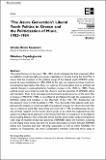Files in this item
‘The Azure Generation’ : liberal youth politics in Greece and the politicisation of music, 1982-1984
Item metadata
| dc.contributor.author | Kassaveti, Orsalia-Eleni | |
| dc.contributor.author | Papadogiannis, Nikolaos | |
| dc.date.accessioned | 2022-01-27T13:30:25Z | |
| dc.date.available | 2022-01-27T13:30:25Z | |
| dc.date.issued | 2022-04-01 | |
| dc.identifier | 277433738 | |
| dc.identifier | c0baf0db-c764-4160-b81b-0b19c6b2e17b | |
| dc.identifier | 000776169900009 | |
| dc.identifier | 85128236386 | |
| dc.identifier.citation | Kassaveti , O-E & Papadogiannis , N 2022 , ' ‘The Azure Generation’ : liberal youth politics in Greece and the politicisation of music, 1982-1984 ' , European History Quarterly , vol. 52 , no. 2 , pp. 296-324 . https://doi.org/10.1177/02656914221085122 | en |
| dc.identifier.issn | 0265-6914 | |
| dc.identifier.other | ORCID: /0000-0002-3521-8152/work/111547516 | |
| dc.identifier.uri | https://hdl.handle.net/10023/24766 | |
| dc.description.abstract | This article focuses on 1982-1984, which witnessed the first systematic effort to establish a moderate right-wing youth organisation in Greece during the Cold War. It shows that the invention of the political songs of the Liberal youth ONNED underpinned its mass mobilisation in 1982-1984. In this vein, our analysis enriches recent historiographical approaches that focus on cultures of Conservatism and on political and cultural changes in postauthoritarian Southern Europe in the 1970s-1980s. Those political songs were linked to both the rhetoric and the practices of ONNED cadres and members. Their lyrics conveyed anti-Communist postmemories of the Civil War in Greece (1943/1946-1949), as reconfigured and filtered through the experiences of ONNED cadres and members in the aftermath of the 1967-1974 dictatorship and the electoral victory of the Socialists in 1981. Thus, the study of the Liberal youth complements the analysis of moderate right-wing subjects in Spain, for whom the Civil War was no reference point after democracy was restored in 1975. Simultaneously, the article enriches research on the Greek Liberal youth so far, which has neglected how this subject reconfigured its approach to the Greek Civil War in comparison to the Right in the preceding decades. Our article also shows that the songs under study accompanied a wide range of ritualistic and prosaic practices of ONNED cadres and members. Listening to and singing those songs was part of a double demarcation process between ONNED cares and members and their left-wing opponents as well as within ONNED. For instance, in Thessaloniki, the more Conservative members embraced those songs, in their leisure activities and their everyday spaces notwithstanding. By contrast, the more centre-right ones were more critical, but still tolerated such music. The everyday life and spatial history approach is crucial to illuminating the varying reception of the political songs of ONNED within this organisation. | |
| dc.format.extent | 543381 | |
| dc.language.iso | eng | |
| dc.relation.ispartof | European History Quarterly | en |
| dc.subject | Youth | en |
| dc.subject | Everyday life | en |
| dc.subject | Liberalism | en |
| dc.subject | Activism | en |
| dc.subject | Post-memories | en |
| dc.subject | DF Greece | en |
| dc.subject | HX Socialism. Communism. Anarchism | en |
| dc.subject | T-NDAS | en |
| dc.subject | SDG 16 - Peace, Justice and Strong Institutions | en |
| dc.subject | AC | en |
| dc.subject.lcc | DF | en |
| dc.subject.lcc | HX | en |
| dc.title | ‘The Azure Generation’ : liberal youth politics in Greece and the politicisation of music, 1982-1984 | en |
| dc.type | Journal article | en |
| dc.contributor.institution | University of St Andrews. School of History | en |
| dc.identifier.doi | https://doi.org/10.1177/02656914221085122 | |
| dc.description.status | Peer reviewed | en |
| dc.identifier.url | https://journals.sagepub.com/toc/ehqb/52/2 | en |
This item appears in the following Collection(s)
Items in the St Andrews Research Repository are protected by copyright, with all rights reserved, unless otherwise indicated.

